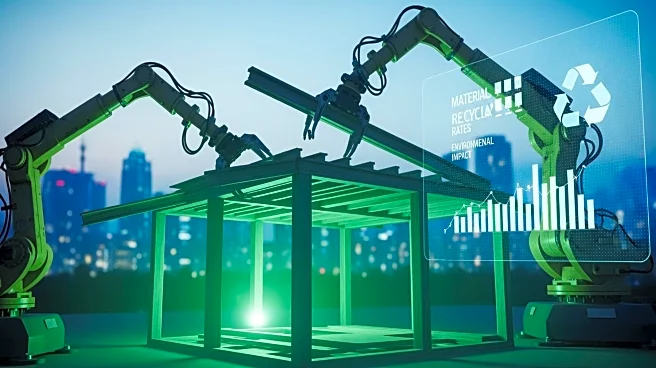What's Happening?
A recent study has proposed eight expert-backed recommendations to accelerate material reuse in the construction industry. The study emphasizes the role of materials passports (MPs) in promoting sustainable
practices by documenting the lifecycle and properties of construction materials. MPs serve as digital databases that enable tracking and tracing of materials, supporting resource efficiency and the transition toward a circular economy. The construction industry is a major contributor to global carbon emissions, and the adoption of MPs could significantly reduce environmental impacts.
Why It's Important?
The construction industry accounts for nearly 40% of energy-related carbon dioxide emissions, making sustainable practices essential for reducing environmental impact. By adopting materials passports, the industry can enhance resource management, minimize waste, and support global sustainability goals. The recommendations provide a strategic roadmap for integrating MPs into construction practices, fostering collaboration among stakeholders and promoting a circular economy. This approach aligns with increasing regulatory pressures aimed at reducing carbon footprints and supports the industry's shift toward sustainability.
What's Next?
The study calls for collective action among industry stakeholders and policymakers to implement the proposed strategies. It highlights the need for technological innovation, supportive policies, and cultural shifts that encourage material reuse and recycling. Future work should explore the practical applications of MPs in real-world projects to refine their implementation and enhance their effectiveness. The successful integration of MPs has the potential to reshape construction practices, ensuring that materials are valued throughout their lifecycle while minimizing environmental impacts.
Beyond the Headlines
The adoption of materials passports represents a strategic pathway toward a more resource-efficient, low-carbon, and sustainable built environment. The study discusses the potential role of emerging technologies such as blockchain and artificial intelligence in enabling secure, transparent, and real-time tracking of materials. These digital tools could further support scalable, automated creation of MPs and improve trust among stakeholders. Regulatory support and incentives are crucial to promoting a cultural shift toward valuing material reuse and recognizing its environmental benefits.










